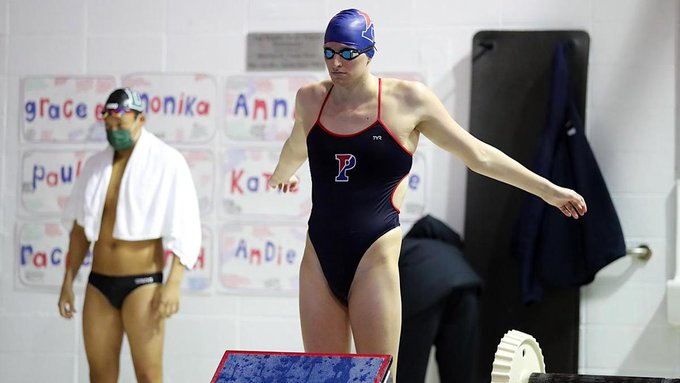University of Pennsylvania's transgender swimmer, Lia Thomas' future apparently remains hanging after USA Swimming released its Athlete Inclusion, Competitive Equality and Eligibility Policy on Tuesday. The transgender swimmer has been receiving heat for being allowed to compete against biological women in light of her record-breaking performances. The 22-year-old swimmer competed as a male at Penn University for three years before her transition.
The news rules state that competitors in women's events must show recorded low levels of testosterone for 36 months. The previous rule required 12 months of testosterone suppression, which allowed Lia Thomas to participate in the upcoming NCAA championship in Atlanta in March. Now, with the rules, Thomas' participation in the event has become a bit foggy.
Lia Thomas' teammates released a joint statement in support of their fellow competitor. Updating their 'elite athlete' policy, USA Swimming noted in the new guidelines that the eligibility criteria consist of 'evidence that the prior physical development of the athlete as a male, as mitigated by any medical intervention, does not give the athlete a competitive advantage over the athlete's cisgender female competitors.'

Eligibility criteria
"Evidence that the concentration of testosterone in the athlete's serum has been less than 5 nmol/L (as measured by liquid chromatography coupled with mass spectrometry) continuously for a period of at least thirty-six (36) months before the date of application," the updated policy further added.
USA Swimming also noted that a panel of three independent medical experts would be responsible for implementing the elite athlete policy.
Under the new guidelines, Thomas would have to disclose the nanomoles per liter in her blood. A biological male has 10-35 nanomoles of testosterone per liter of blood, while a biological female has 0.5-2.5.

'We support Lia in her transition'
According to the New York Post, Independent Women's Law Center (IWLC) and Independent Women's Forum (IWF) raise objections over USA Swimming's policies. IWLC director Jennifer C. Braceras said in a statement that USA Swimming's stance that 'there is some way to eliminate the athletic advantage that post-pubescent males have over females denies science.' "It also ignores the fact that this is not only about fair competition – it is also about equal opportunity to compete at all," the statement further added.
Thomas' teammates also released a statement stating that they extend their full support to Lia in her transition. "The sentiments put forward by an anonymous member of our team are not representative of the feelings, values, and opinions of the entire Penn team, composed of 39 women with diverse backgrounds," the statement added.








